It’s The End of The World As We Know It… And I Don’t Feel Fine
9 min readI.
My father always had time for me; he never got frustrated or angry. I remember his everyday mood, ready for hugs and an update on my day. The consistency of his love walks alongside every season of my life. He could never resist getting me chili chips and chocolate on his way home from work. In my thirties I had to beg him to stop.
My father was committed to his businesses and proud of his work. I remember being four and going to a factory with spinning looms of glittery thread. The place was dank and dark; low ceilings and a row of stools for workers. He would explain how this material was used for decorations, clothing, and of course the ever-famous glittery shaadi ke haar (wedding garlands) from the 1980s.
As I grew so did my father’s business. Soon that spinning loom plant was replaced with machinery that would print colorful images on plastic for single use items like popsicles, chocolate, and supari. Another business was purchased where long cylinders, rust and red colored, were filled with carbon dioxide, and then transported to cola companies. The cylinders were how the fizz got in the ‘soft’ drinks. I freely consumed nearly seven a day, without guilt, for most of my childhood and young adulthood.
I loved going with my father to his factories. I watched him with delight as he walked through his daily round of the machinery. I listened to him making deals on the phone while I practiced turning in circles on his office chairs.
The eight-year-old Aisha eagerly bought her Daddy a desk decoration of two bunnies cuddling in a metal heart shape. He had never loved a gift more, I’m certain. If it wasn’t for a fire that destroyed his office, I am confident those bunnies would still be with him.
Children from business families rarely ask what is behind their lifestyles; be it the labor or the production behind it. There is lavish spending on celebrations, attending the best schools, traveling to other glamorous parts of the world and a constant churning of consumption. Underneath the top of the food chain is a belief being passed on from generation to generation: short-term to long-term harm to the earth is not our problem because ultimately making money is what matters.
Besides the cognitive dissonance from growing up rich in a city inhumanely poor like Karachi there is a slippery emotional discomfort to confront our own nefarious role in the destruction of the environment. Who am I without the urban comforts that are wired into my nervous system? Until I am willing and able to dismantle my attachments to convenience and the dopamine surge I crave from shopping I will continue to be a heavy handed player in this deadly march to the end of the world as we know it.
The advantages I have is not like a snakeskin that I can discard. Like all people with privilege my life is the way it is because it feeds off the cheap labor of millions who have no choice but to live with less.
It feels like I’m choking on a cactus when I try to reconcile the benevolence of my father’s love and the ruthlessness of his capitalist endeavors to give us a ‘good’ life. I remember petitioning for workers rights throughout my twenties, while sitting in our air-conditioned drawing room, going to parties and buying new clothes every week.
My father repeatedly disciplined or fired any workers who tried to organize for better conditions or pay, at home or at the factory. Our ‘good’ life of being able to buy whatever we want and my education came from creating products that take hundreds of years to decompose, leaving traces of micro plastic in our oceans, rivers and air.
My arguments have done little to challenge the status quo that my father firmly believes as ethically sound. His belief in the capitalist system, the trickle down economy and the meritocracy myth is unfettered.
Now almost 80, weak and blind, my father is unable to comprehend how the world his grandchildren will inherit is no longer viable.
My parents continue to buy an inordinate amount of single use plastic and smoke cigarettes whose buds can take up to 10 years to decompose. There is never a speck of trash in their bedroom. Instead it piles up outside the gate, clogging the open drainage, burnt every so often to seep roasted air through our windows.
What’s happening outside the house doesn’t matter until it rains and all the filth comes flooding inside.
II.
(This section refers to anecdotal data I collected from a survey distributed to my online network completed by 61 people. )
Hearing about climate crisis feels like getting a message on your phone about someone getting a cancer diagnosis. It feels personal yet distant. We may get despondent and then move on to the next thing on our to-do list.
We perpetrate violence on the earth as nonchalantly as eating popcorn while watching a movie.
We concede the earth is getting warmer. We agree that the future for our children looks bleak because of climate change.
In a typical day, how many hours do we spend outside? How many artificial environments do we sustain through air conditioning or heating? How many hours do we spend commuting in your car? How often do we fly for business or pleasure?
Despite a near unanimous agreement amongst the survey respondents that climate change is happening right now only two thirds of them are willing to reduce their energy usage to combat it.
I could hypothesize that some of us believe things are not as bad as the studies show because there is still petrol at the station. There is still food in the grocery shop or on the fruit stand. There are still planes flying in the air. And of course our millennial addiction, we have increasingly fast Wi-Fi and permanently plugged in smartphones.
Another way to understand our lack of action, lack of planning, and lack of specific knowledge about climate change is to recognize how humans are morbidly self-centered, alienated from nature and programmed to approach life in a winner gets all perspective.
Then there are those who fall somewhere in between. We care deeply yet are stuck, breathless as the cement dries around our ways of living.
Maybe your day is like mine, littered (pun intended) with individual actions I hope are helping the environment. I do this because I care, but also so that my denial can live another day. I’m unable to look at the tidal wave that will swallow the future of my children. I’m not alone. A majority of the parents I heard from expressed a similar fear.
There is also a Grand Canyon sized hole in our strategy because there is little persistent and collective organizing to hold the largest polluters accountable. Most of us know little about what our countries governments or international organizations are implementing to mitigate the impact of the crisis.
We don’t know how many mines have permits to excavate for metal and other materials that we demand for our technology. We don’t know how many oil refineries are churning toxic fumes into our air. We don’t know how many factories are producing an avalanche of stuff that can take hundreds to thousands of years to decompose.
Mainstream media and dominant culture portrays the life of the capitalist elite with unexamined idolatry. This derails the urgent need for envisioning life without these parameters of wealth, consumption and urbanization.
The media does not prioritize reporting on the climate crisis. We don’t hear much when there are oil spills or entire communities usurped in the name of development and progress.
To return to a ‘balance’ with the earth means that almost everything we do in our day-to-day lives has to change.
This is terrifying.
Click below to listen to my reflections about this survey.
III.
The doom and gloom about our world triggers collective and personal trauma. Many of us have mastered disassociation as a way to cope. Many of us have mastered denial or fatalism. Many of us tune out news like how a child born in 2021 will experience on average “seven times as many heat waves, twice as many wildfires and nearly three times as many droughts, crop failures and river floods as their grandparents,” according to NBC News earlier this month.
Our ability to respond to this crisis can only begin when we step out of a pool of despair and enter an arena of pragmatic hope.
There are many things you can do. You can use less water. You can buy less packaged food. You can organize meetings in your neighborhood. You can follow the trash truck and hold your municipalities and governments accountable. You can volunteer for clean up campaigns. You can engage with the media industry. Caregivers can teach children the true cost of our indulgences. Adults can stop the treadmill and support younger activists who understand the extremity and uncertainty of their futures.
You can study communities where the leaders have prioritized action both in policy and on the ground.
You can notice your own reaction, likely mixture of grief and fear, when letting go of the old kingdom of beliefs that have led us to this place.
If you believe the gravest predictions that it is already too late for recovery, you can ask yourself, if this is the time that humanity is dying, then how do you want to die? What kind of treatment would you want if you had this metastasized cancer in your body?
The spiritual traditions of many faiths are a source of courage and hope towards living a life of climate activism. The ancient Haudenosaunee (Iroquois) wrote the Seventh Generation Principle 500 years a go, which emphasized that any decisions made should result in a sustainable world for the next seven generations.
Surah Rehman invites us with the repeated refrain, “Which of your Lord’s wonders can you deny?” There are many lives we can model that have disavowed the traps of elitism, capitalism, and more is better, including that of our Prophet Muhammad (Peace be Upon Him). Pakistanis are particularly fortunate because we have the example of Edhi sahib.
The most powerful mechanism I have for hope is to revert to a wonder and awe of the natural world. Yes we are programmed to seek comfort but we are also programmed for connection. To restore this earth and our rightful place in it we must find ways to experience communion with this earth’s magnificence. We must become embodied in our longing to love the place that gives us shelter and daily miracles to witness.
Our entire future rests upon us changing our ways radically and permanently.
The writer teaches yoga in Islamabad where she lives with her husband and three sons. She tweets at @AishaChapra
For the latest news, follow us on Twitter @Aaj_Urdu. We are also on Facebook, Instagram and YouTube.
















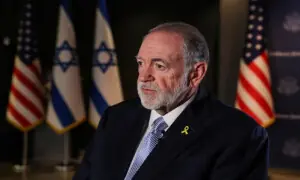


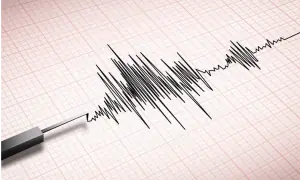

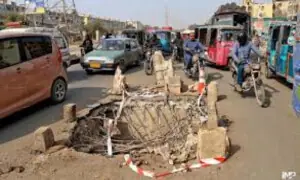

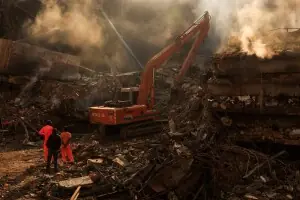
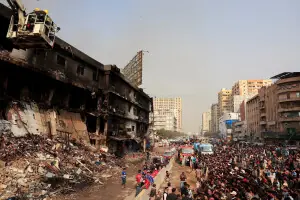
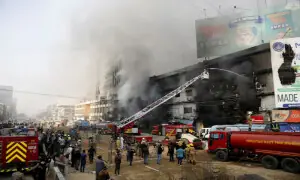

Comments are closed on this story.